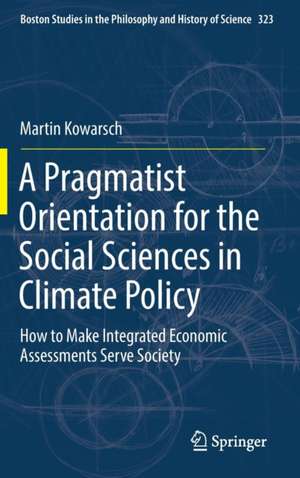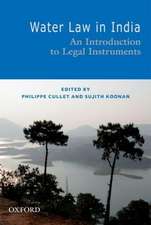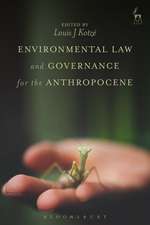A Pragmatist Orientation for the Social Sciences in Climate Policy: How to Make Integrated Economic Assessments Serve Society: Boston Studies in the Philosophy and History of Science, cartea 323
Autor Martin Kowarschen Limba Engleză Hardback – 9 sep 2016
| Toate formatele și edițiile | Preț | Express |
|---|---|---|
| Paperback (1) | 642.83 lei 6-8 săpt. | |
| Springer International Publishing – 14 iun 2018 | 642.83 lei 6-8 săpt. | |
| Hardback (1) | 649.06 lei 6-8 săpt. | |
| Springer International Publishing – 9 sep 2016 | 649.06 lei 6-8 săpt. |
Din seria Boston Studies in the Philosophy and History of Science
- 18%
 Preț: 944.19 lei
Preț: 944.19 lei - 15%
 Preț: 646.75 lei
Preț: 646.75 lei - 15%
 Preț: 646.75 lei
Preț: 646.75 lei - 15%
 Preț: 699.28 lei
Preț: 699.28 lei - 18%
 Preț: 736.50 lei
Preț: 736.50 lei -
 Preț: 500.02 lei
Preț: 500.02 lei - 15%
 Preț: 643.16 lei
Preț: 643.16 lei - 15%
 Preț: 650.69 lei
Preț: 650.69 lei - 15%
 Preț: 634.18 lei
Preț: 634.18 lei - 15%
 Preț: 642.68 lei
Preț: 642.68 lei -
 Preț: 391.40 lei
Preț: 391.40 lei -
 Preț: 383.33 lei
Preț: 383.33 lei - 18%
 Preț: 944.19 lei
Preț: 944.19 lei - 18%
 Preț: 955.56 lei
Preț: 955.56 lei - 15%
 Preț: 643.65 lei
Preț: 643.65 lei -
 Preț: 392.75 lei
Preț: 392.75 lei - 18%
 Preț: 1229.10 lei
Preț: 1229.10 lei - 18%
 Preț: 1238.23 lei
Preț: 1238.23 lei - 18%
 Preț: 951.29 lei
Preț: 951.29 lei - 18%
 Preț: 1223.25 lei
Preț: 1223.25 lei - 18%
 Preț: 1225.79 lei
Preț: 1225.79 lei - 18%
 Preț: 1226.42 lei
Preț: 1226.42 lei - 18%
 Preț: 1236.82 lei
Preț: 1236.82 lei - 15%
 Preț: 644.49 lei
Preț: 644.49 lei - 18%
 Preț: 1231.78 lei
Preț: 1231.78 lei - 15%
 Preț: 644.30 lei
Preț: 644.30 lei - 18%
 Preț: 957.62 lei
Preț: 957.62 lei - 18%
 Preț: 1222.49 lei
Preț: 1222.49 lei - 18%
 Preț: 947.50 lei
Preț: 947.50 lei - 18%
 Preț: 1833.95 lei
Preț: 1833.95 lei - 18%
 Preț: 1227.99 lei
Preț: 1227.99 lei - 18%
 Preț: 947.35 lei
Preț: 947.35 lei
Preț: 649.06 lei
Preț vechi: 763.60 lei
-15% Nou
Puncte Express: 974
Preț estimativ în valută:
124.19€ • 129.68$ • 102.56£
124.19€ • 129.68$ • 102.56£
Carte tipărită la comandă
Livrare economică 16-30 aprilie
Preluare comenzi: 021 569.72.76
Specificații
ISBN-13: 9783319432793
ISBN-10: 3319432796
Pagini: 347
Ilustrații: XVII, 326 p. 5 illus.
Dimensiuni: 155 x 235 x 21 mm
Greutate: 0.66 kg
Ediția:1st ed. 2016
Editura: Springer International Publishing
Colecția Springer
Seria Boston Studies in the Philosophy and History of Science
Locul publicării:Cham, Switzerland
ISBN-10: 3319432796
Pagini: 347
Ilustrații: XVII, 326 p. 5 illus.
Dimensiuni: 155 x 235 x 21 mm
Greutate: 0.66 kg
Ediția:1st ed. 2016
Editura: Springer International Publishing
Colecția Springer
Seria Boston Studies in the Philosophy and History of Science
Locul publicării:Cham, Switzerland
Cuprins
1. Introduction.- Part I: The Key Challenge of Integrated Economic Advice for Climate Policy.- 2. The Need for an Integrated Economic Assessment of Climate Policy Options.- 3. Fundamental Perils for Scientific Assessments.- Part II: A Philosophical Evaluation of Normative Science-Policy Models.- 4. Prevalent Action-Guiding Models of Scientific Expertise in Policy.- 5. Fact/Value Conflation and the Danger of the Traditional Models.- 6. Pragmatism: Objectivity Despite Fact/Value Entanglement.- Part III: A Critical Look at the IPCC’s Economics.- 7. Understanding and Evaluating the IAM-based Economics.- 8. Ethics in Climate Economics: Balance or Bias?.- 9. Trust Them? The Epistemic Quality of Climate Economics.- 10. An Evaluation of the IPCC WG III Assessments.- Part IV: Towards Improved Integrated Economic Assessments for Climate Policy.- 11. Elements of a Guideline for Future Integrated Economic Assessments of the IPCC.- 12. Potential Implications of the IPCC Reform: Deliberative Learning and Difficulties of In-depth Policy Assessment.
Textul de pe ultima copertă
While economic and other social science expertise is indispensable for successful public policy-making regarding global climate change, social scientists face trade-offs between the scientific credibility, policy-relevance, and legitimacy of their policy advice. From a philosophical perspective, this book systematically addresses these trade-offs and other crucial challenges facing the integrated economic assessments of the Intergovernmental Panel on Climate Change (IPCC). Based on John Dewey’s pragmatist philosophy and an analysis of the value-laden nature and reliability of climate change economics, the book develops a refined science-policy model and specific guidelines for these assessments of climate policy options. The core idea is to scientifically explore the various practical implications of alternative climate policy pathways in an interdisciplinary manner, together with diverse stakeholders. This could facilitate an iterative, deliberative public learning process concerning disputed policy issues. This volume makes novel contributions to three strands of the literature: (1) the philosophy of (social) science in policy; (2) the philosophy of economics; and (3) debates about the design of scientific assessments, including the continuous IPCC reform debate. This work is thus interesting for philosophers and other scholars reflecting on the science-policy interface, but also for assessment practitioners, climate policy-makers, and economists. The science-policy approach developed in this volume has already influenced the recent socio-economic IPCC assessment.
Caracteristici
Provides far-reaching orientation for social science assessments and helps to inform climate policy in a more reliable, policy-relevant and legimitate manner Offers particular guidance for the essential treatment of conflicting arguments and value judgements in socio-economic assessments Timely, because the refined science-policy model presented here adds to current debates on (social) science in policy, and the model already influenced recent IPCC assessments Contributes to the implementation and refinement of deliberative democracy












